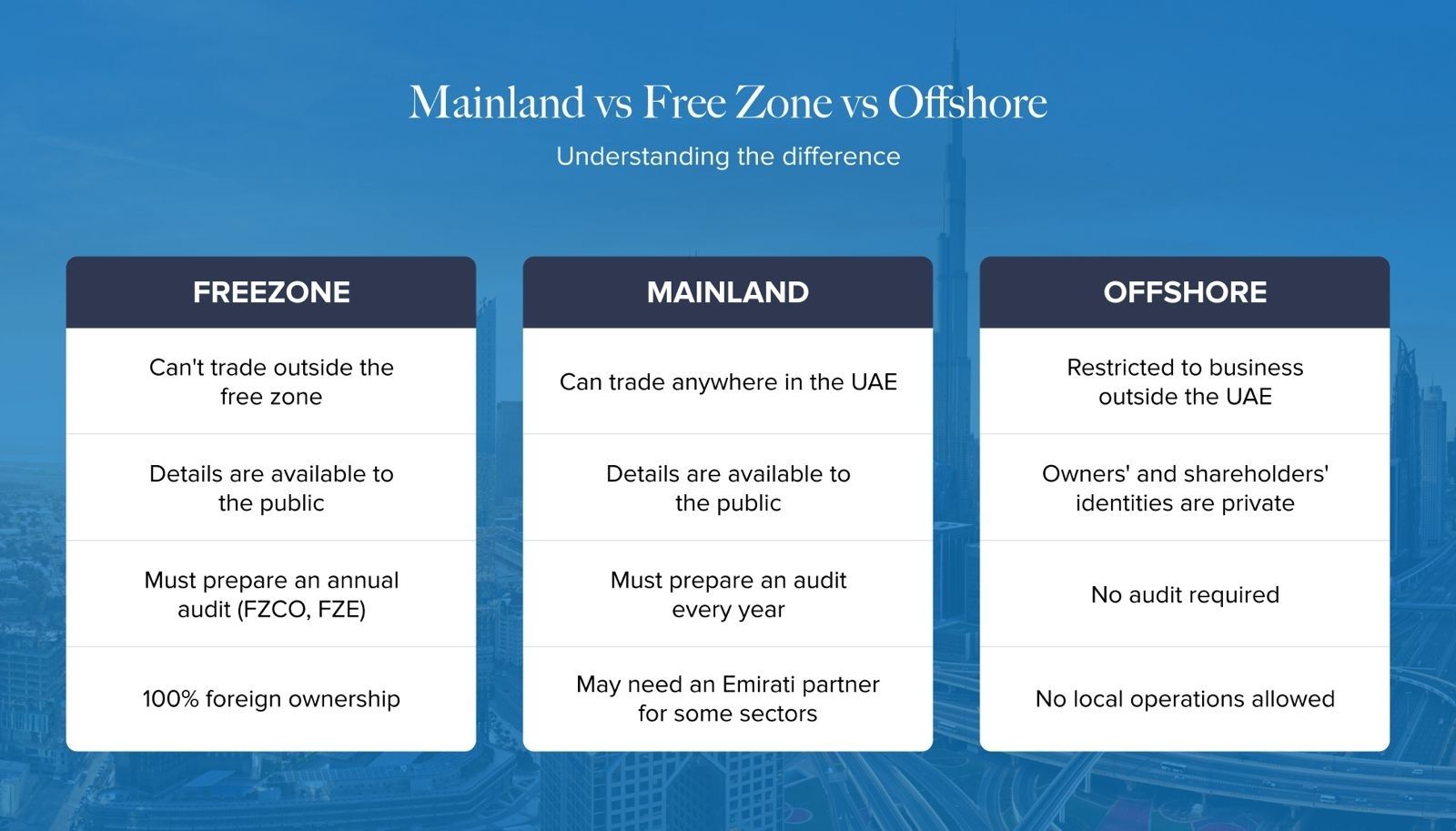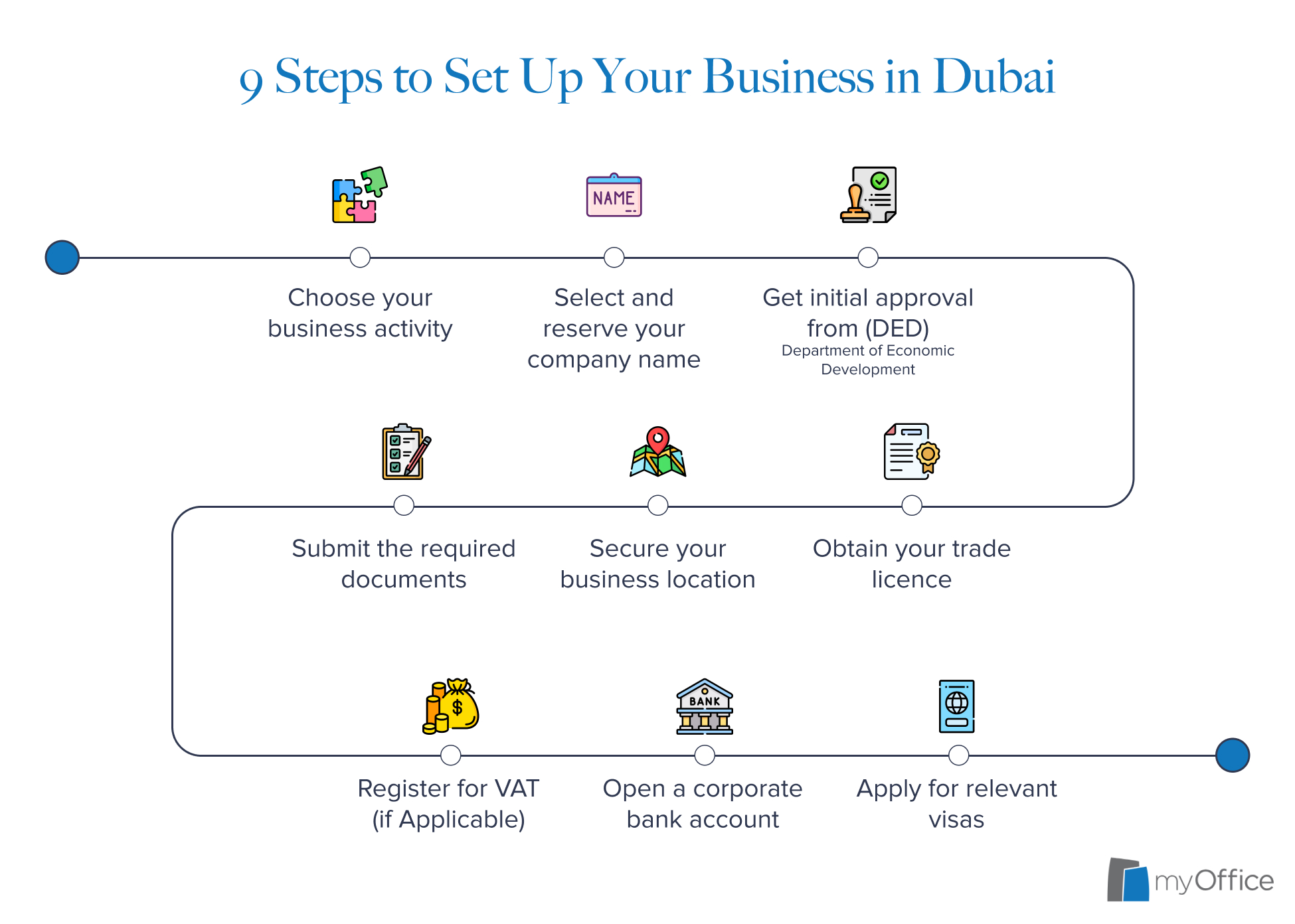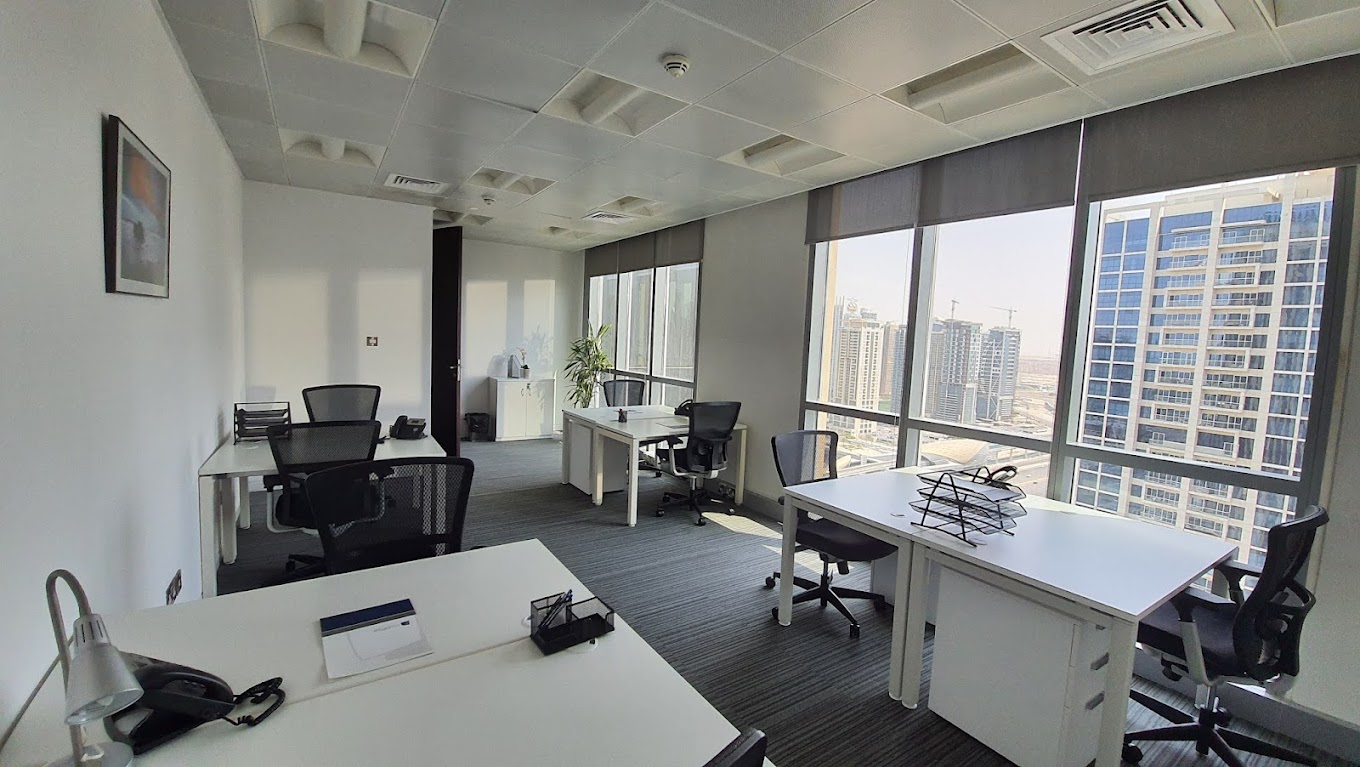Dubai has emerged as a global business hub offering a unique blend of strategic location, world-class infrastructure, and business-friendly policies. With its robust economy and vision for the future, Dubai presents an attractive option for entrepreneurs and companies looking to expand their operations.
In the first half of 2024, Dubai’s GDP grew by an impressive 3.6%, with projections for continued growth. That is why the UAE is a low-risk country for doing business, with a risk level of 2 out of 7. This favourable business environment, with tax benefits and a strategic location, makes it an ideal destination for company formation in Dubai.
Why Choose Dubai for Your Business
Dubai gives one of the most flexible and business-friendly rules in the region, making it easier for new businesses to launch and scale. Authorities have streamlined licensing and visa processes, allowing entrepreneurs to focus more on growth and less on red tape, which makes business setup in Dubai highly efficient.
In addition to its thriving economy, Dubai fosters innovation through access to modern co-working spaces, smart government services, and a strong digital infrastructure. Whether you’re a startup or an established enterprise, the city provides the tools and resources to support long-term success in company formation in Dubai.
Understanding Business Setup Options in Dubai

When it comes to business setup in Dubai, entrepreneurs have three main options:
-
Mainland Company
Allows for direct trading within the UAE and internationally. Most business activities now permit 100% foreign ownership, though some strategic sectors may require an Emirati partner. Depending on the nature of your business setup in the Dubai mainland.
-
Free Zone Company
Offers 100% foreign ownership, 0% corporate tax, up to AED 375,000 in profits, and other incentives. However, direct trading with the local UAE market is restricted without a local partner or distributor, which impacts your business setup in the Dubai free zone strategy.
-
Offshore Company
This is ideal for businesses operating outside Dubai, which offers privacy and flexibility but with limitations on local operations. This structure supports international company formation in Dubai while maintaining confidentiality and ensuring compliance with local regulations.
Each option has its unique benefits and considerations, which we’ll explore in detail throughout this guide on business setup in Dubai.
Step-by-Step Guide to Business Setup in Dubai
 />
/>
Setting up a business in Dubai involves several key steps:
-
Choose Your Business Activity and Setup Type
Select the activity your company will undertake, such as trading, consultancy, or services. Then, choose your setup type: the mainland allows operating across the UAE, the free zone offers full foreign ownership with limitations on local trade, and the offshore option is used mainly for international business. Each option has different rules, benefits, and costs involved in company formation in Dubai.
-
Select and Reserve Your Company Name
Choose a unique business name that complies with UAE naming rules, avoiding restricted or offensive terms. If the name includes a personal name, it must follow what the owner or partner’s real name. Reserve your chosen name with the Department of Economic Development (DED) or your selected free zone authority as part of your business setup in Dubai process.
-
Get Initial Approval From the Department of Economic Development (DED)
Initial approval confirms the government has no objection to your proposed business and its activities. You’ll need to submit documents such as passport copies, business activity details, and your reserved name. This step allows you to proceed with setting up but does not yet permit operations.
-
Prepare and Submit the Required Documents
Gather essential documents, including passport copies, your trade name reservation, initial approval, and your company’s Memorandum of Association. You must also provide your tenancy contract and any special approvals if your business is in a regulated sector. Submit everything to the DED for final review and approval for business setup in the Dubai mainland or a free zone.
-
Secure Your Business Location
Your business must have a registered address, which could be an office, warehouse, or co-working space. Sign a tenancy contract and ensure it is registered through the appropriate real estate system, such as Tawtheeq or Ejari. The office size must match the number of visas or employees you plan to sponsor.
-
Obtain Your Trade Licence
Once all paperwork is complete, apply for the trade licence that officially allows you to operate. Submit your final documents and pay the necessary government fees. Once approved, your business setup Dubai is legally established.
-
Register for VAT (If Applicable)
If your annual turnover exceeds AED 375,000, VAT registration is mandatory. You must apply through the Federal Tax Authority’s website and start charging 5% VAT on taxable supplies. Smaller businesses may also register voluntarily as part of their company formation in Dubai.
-
Open a Corporate Bank Account
After receiving your trade licence, approach a local bank to open a business account. Provide required documents such as your licence, company structure, and ID copies of shareholders. The process may take several days as banks conduct background checks.
-
Apply for Relevant Visas
Once your company is registered, you can apply for your UAE residence visa as a business owner. You can also sponsor employee visas depending on your office size and business activity. Visa applicants must complete a medical exam and Emirates ID registration.
Choosing the Right Business Activity and Licence

Selecting the appropriate business activity and licence type is fundamental to your business setup in Dubai. The Department of Economic Development (DED) issues several types of licences:
-
Commercial Licence
This licence is suitable for businesses involved in trading activities, such as importing, exporting, buying, and selling goods. If you intend to operate a shop, supermarket, or general trading company, a commercial licence will be required for your business setup in the Dubai mainland or free zone.
-
Industrial Licence
An industrial licence is necessary for companies engaged in manufacturing or industrial production. This covers activities like assembling, processing, or producing goods from raw materials, important for company formation in Dubai in the industrial sector.
-
Professional Licence
Professional licences are designed for service providers and skilled professionals such as consultants, accountants, engineers, or IT specialists. This licence permits individuals or companies to offer expertise and professional services rather than goods.
-
Tourism Licence
If your business relates to tourism, hospitality, or travel services, such as travel agencies, hotels, or tour operators, a tourism licence is required. This licence facilitates your business setup in the Dubai free zone or mainland in the tourism sector.
-
Agricultural Licence
Businesses involved in farming, cultivation, and the production of agricultural goods need an agricultural licence. This includes activities like raising livestock or supplying agricultural products. In short, this licence supports company formation in Dubai for agricultural ventures.
-
Crafts Licence
A crafts licence is intended for artisans and small-scale producers engaged in traditional crafts, handiwork, or small manufacturing. This licence supports local craftsmanship and small business ventures in sectors like textiles, pottery, or jewellery making.
Your choice will depend on the nature of your business activities. For instance, if you’re planning to start an import and export business in Dubai, you’ll likely need a commercial licence. It’s crucial to accurately define your activities as this will impact various aspects of your setup, including costs and regulatory requirements.
Legal Structures and Ownership Considerations
The legal structure of your business in Dubai will depend on several factors, including the type of business setup you choose and the nature of your business activities. Here are some common structures used in company formation in Dubai:
-
Limited Liability Company (LLC)
-
Branch of a Foreign Company
-
Representative Office
-
Free Zone Company
-
Offshore Company
For mainland companies, recent changes now allow 100% foreign ownership in many sectors, eliminating the previous requirement for a local sponsor. However, some strategic sectors may still require Emirati partnerships for business setup in the Dubai mainland.
Free zone companies offer 100% foreign ownership by default, making them a popular choice for international businesses. Each free zone may have its own set of regulations and benefits, so it’s worth researching options to find the best fit for your business setup in a Dubai free zone.
Office Space and Location Requirements

Securing a physical address is mandatory for businesses in Dubai. Your options include:
-
Renting or buying commercial property
This option is ideal for established businesses that need dedicated premises for daily operations. It provides full control over the space but comes with higher upfront costs, often necessary for business setup in the Dubai mainland.
-
Using serviced offices or co-working spaces
Serviced offices and co-working spaces offer flexible, ready-to-use office solutions with shared amenities. They are cost-effective and suitable for startups, freelancers, or small teams during business setup Dubai.
-
Virtual offices are available for some free zone setups
Virtual offices provide a registered address without the need for a physical workspace. This is allowed in certain free zones for businesses that operate remotely, making it a convenient option for business setup in the Dubai Free Zone.
For mainland companies, there’s typically a minimum office space requirement of 200 square feet. Free zone companies may have more flexible options, including the possibility of using the free zone’s facilities as your registered address.
Financial Aspects: Costs, Banking, and Taxation
Understanding the financial implications of business setup in Dubai is crucial for proper planning. Key considerations include:
-
Setup Costs: These vary widely depending on your business type, location, and activities. Business setup in the Dubai mainland generally has higher initial costs compared to free zones.
-
Banking: Opening a corporate bank account is a critical step in company formation in Dubai. The UAE has numerous local and international banks to choose from, each with its own requirements and benefits.
-
Taxation: The UAE offers a favourable tax environment:
0% personal income tax
9% corporate tax on profits above AED 375,000 (as of 2023)
5% VAT on most goods and services
Visa and Residency Considerations
As a business owner in Dubai, you’ll be eligible to apply for residency visas for yourself, your family, and your employees. The number of visas you can sponsor typically depends on your business setup type, office space, and capital investment.
Key points to remember:
Mainland companies generally have more flexibility in visa allocation
Free zone visas are often tied to specific packages or office space
The UAE offers long-term visas, such as 5 and 10 years, for certain categories of investors and entrepreneurs
Timeline and Common Challenges
The timeline for business setup in Dubai can vary, but typically ranges from 2 to 8 weeks, depending on the complexity of your business and the chosen setup type. Free zone setups are often quicker, while mainland setups may take longer due to additional approvals required.
Common challenges include:
Navigating the documentation process
Understanding and complying with regulations
Opening a corporate bank account (especially for certain nationalities)
Securing the right talent for your business
Working with experienced consultants can help mitigate these challenges and streamline the setup process.
Working with experienced consultants can help mitigate these challenges and streamline the company formation in Dubai process.
Launching Your Business in Dubai with Confidence
Setting up a business in Dubai offers incredible opportunities for growth, innovation, and global reach. By choosing the right setup type, legal structure, and licence, you can build a strong foundation in one of the world’s most dynamic business environments. While the process may seem complex at first, having the right guidance and resources can make all the difference.
Partnering with a reliable business centre like myOffice ensures you have expert support at every stage, from securing office space to managing documentation and compliance, making your business setup Dubai journey smooth and successful.
Frequently Asked Questions
How much does it cost to set up a business in Dubai?
Costs vary widely depending on the type of setup, location, and the nature of business activities. Free zone setups can start from around AED 15,000, while mainland setups typically start from AED 50,000.
Can foreigners own 100% of a company in Dubai?
Yes, 100% foreign ownership is now possible for many business activities in both free zones and the mainland. However, some strategic sectors may still require local partnerships.
How long does it take to set up a business in Dubai?
The process typically takes 2-8 weeks, depending on the complexity of your business and chosen setup type.
Do I need a physical office to set up a business in Dubai?
Most setups require a physical address. However, some free zones offer virtual office options for certain business types.
What are the main types of business licences in Dubai?
The main types are Commercial, Industrial, Professional, Tourism, Agricultural, and Crafts licences.
Can I sponsor my family members on a business visa?
Yes, business owners can typically sponsor family members for residency visas.
What are the tax implications of setting up a business in Dubai?
The UAE has no personal income tax, a 9% corporate tax on profits exceeding AED 375,000, and a 5% VAT on most goods and services.
How do I choose between a mainland and a free zone setup?
This depends on your business activities, target market, and long-term goals. Mainland setups offer more flexibility in local trading, while free zones provide more tax incentives.
What support is available for new businesses in Dubai?
Dubai provides a range of support services, including government initiatives, free zone support, business incubators, and networking events.
Can I convert my free zone company to a mainland company later?
Yes, it’s possible to convert your free zone company to a mainland company, though the process involves re-registration and obtaining new licences.

Leave a Reply